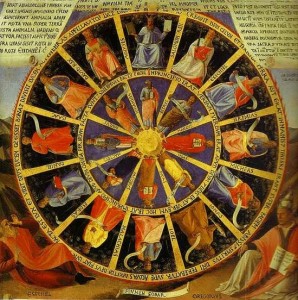Thoughts on Today’s Lessons for Sept. 7, 2014
First Reading: Exodus 12:1-14In highly specific instructions, God ordains a symbolic meal for a people on the run. Having fought hard-hearted Pharaoh through a dozen plagues with God’s help, the people now stand on the brink of escape from slavery in Egypt. This joyous outcome, though, must begin with a horrible, bloody punishment visited not only on the children and animals of Egypt but on their pagan gods, while the chosen people are saved, literally, by the blood of the lamb. This gory sacrifice may belong to a place and time in ancient history, but the underlying grace remains: God has delivered God’s people into freedom.
First Reading (Track 2): Ezekiel 33:7-11
The Prophet Ezekiel, identified in tradition as a priest exiled to Babylon six centuries before Jesus, during the wars that would eventually lead to the destruction of Jerusalem and the Temple, warned the people that God would punish them for their wickedness by taking away the covenant that had given them the promised land. In these verses, the prophet hears God’s warning that God does not desire to punish the people, but wishes that they would save their lives by turning back – repenting – from their evil ways.
Psalm: Psalm 149
Today’s Psalm joyously dances and shakes tambourines to celebrate a God’s gift of victory for the faithful. It is couched in the language of violence, exulting in the swords, fetters and iron chains used to execute vengeance against the people’s enemies. We might wish for a more peaceful view of God, but it is important to recognize the range of emotion in the Psalms, from this warrior shout of victory to the quiet, protective love of the Good Shepherd in Psalm 23.
Psalm (Track 2): Psalm 119:33-40
Psalm 119, the longest Psalm, celebrates God’s Torah as a glorious gift to humankind. The Psalms in English often render “Torah” as “laws,” “statutes” or “ordinances,” but the source of the Psalmist’s affection may be more clear when we understand it as God’s “teaching.” Here’s a curiosity: This entire Psalm is an “alphabetic acrostic.” Every line in each of its 22 eight-verse stanzas begins with a Hebrew letter in alphabetical order. The lines of today’s reading all begin with the Hebrew letter “Hey,” or “H.”
Second Reading: Romans 13:8-14
Seeking to bridge the worlds of Jewish and Gentile Christianity, Paul focuses onthe law. He looks at Jesus’ commandment to love our neighbors, and recognizes that this incorporates all the commandments. Love, he says, does no wrong to those around us. If we love our neighbors; we won’t do things that hurt our neighbors. We won’t kill them, we won’t steal from them, we won’t be jealous of what they have. Love fulfills the law.
Gospel: Matthew 18:15-20
Here is Jesus’ promise that he will be there among us when we gather in his name, in prayer and in the real presence of the Eucharist. But what is this about “gathering two or three” to work out conflicts among members of the church? We might not like it much if the church nowadays followed this formal practice to sort out one another’s sins. But Jesus may be getting at something deeper: When we gather together, in celebration or in conflict, Jesus is with us and shows us the way.

